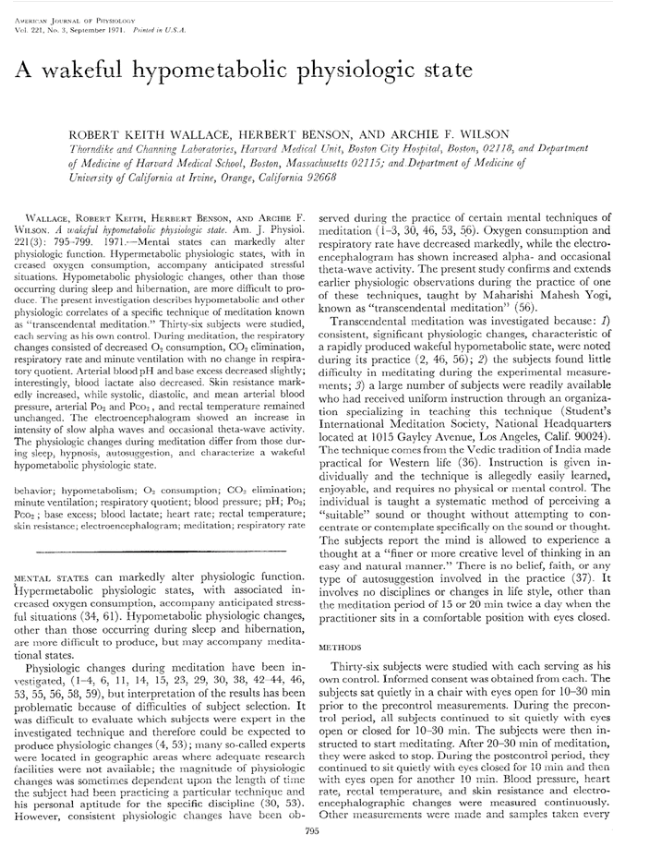Mental states can markedly alter physiologic function. Hypermetabolic physiologic states, with an increased oxygen consumption, accompany anticipated stressful situations. Hypometabolic physiologic changes, other than those occurring during sleep and hibernation, are more difficult to produce. The present investigation describes hypometabolic and other physiologic correlates of a specific technique of meditation know as “transcendental meditation”. Thirty-six subjects were studied, each serving as his own control. During meditation, the respiratory changes consisted of decreased O2 consumption, CO2 elimination, respiratory rate and minute ventilation with no change in respiratory quotient. Arterial blood pH and base excess decreased slightly; interestingly, blood lactate also decreased. Skin resistance markedly increased, while systolic, diastolic, and mean arterial blood pressure, arterial PO2 and PCO2, and rectal temperature remained unchanged. The electroencephalogram showed an increase in intensity of slow alpha waves and occasional theta-wave activity. The physiologic changes during meditation differ from those during sleep, hypnosis, autosuggestion, and characterize a wakeful hypometabolic physiologic state.
A wakeful hypometabolic physiologic state
Publication
American Journal of Physiology
Vol 221, No. 3
Abstract
Web and Email Links
Related Listings
Journal
Behavioral Medicine
To clarify the mechanisms of gender-related mind/body relationships, the authors analyzed the characteristics of 1,132 outpatients (848 women and 284 men) attending a mind/body medicine clinic. At entry in the program, the patients completed the Medical Symptom Checklist, Symptom Checklist-90 revised (SCL-90R), and Stress Perception Scale. Women reported 9 out of 12 symptoms (fatigue, insomnia, headache, back pain, joint or limb pain, palpitations, constipation, nausea, and dizziness) […]
Journal
Behaviour Research Therapy
Ten of thirteen original participants with Irritable Bowel Syndrome (IBS) participated in a one year follow-up study to determine whether the effects of Relaxation Response Meditation (RRM) on IBS symptom reduction were maintained over the long-term. From pre-treatment to one-year follow-up, significant reductions were noted for the symptoms of abdominal pain (p=0.017), diarrhea (p=0.045), flatulence (p=0.030), and bloating (p=0.018). When we examined changes from the original three m […]
Journal
Journal of Human Stress
The efficacy of the regular elicitation of the relaxation response in reducing surgical anxiety and pain in an ambulatory surgery setting was studied in a population of patients scheduled for the surgical removal of a skin cancer. Forty-nine patients with skin cancer were enrolled in the study immediately after being informed of the ned for surgery; 21 of these patients elicited the relaxation response 20 minutes per day until the day of surgery, 21 read for 20 minutes per day, and 7 […]

